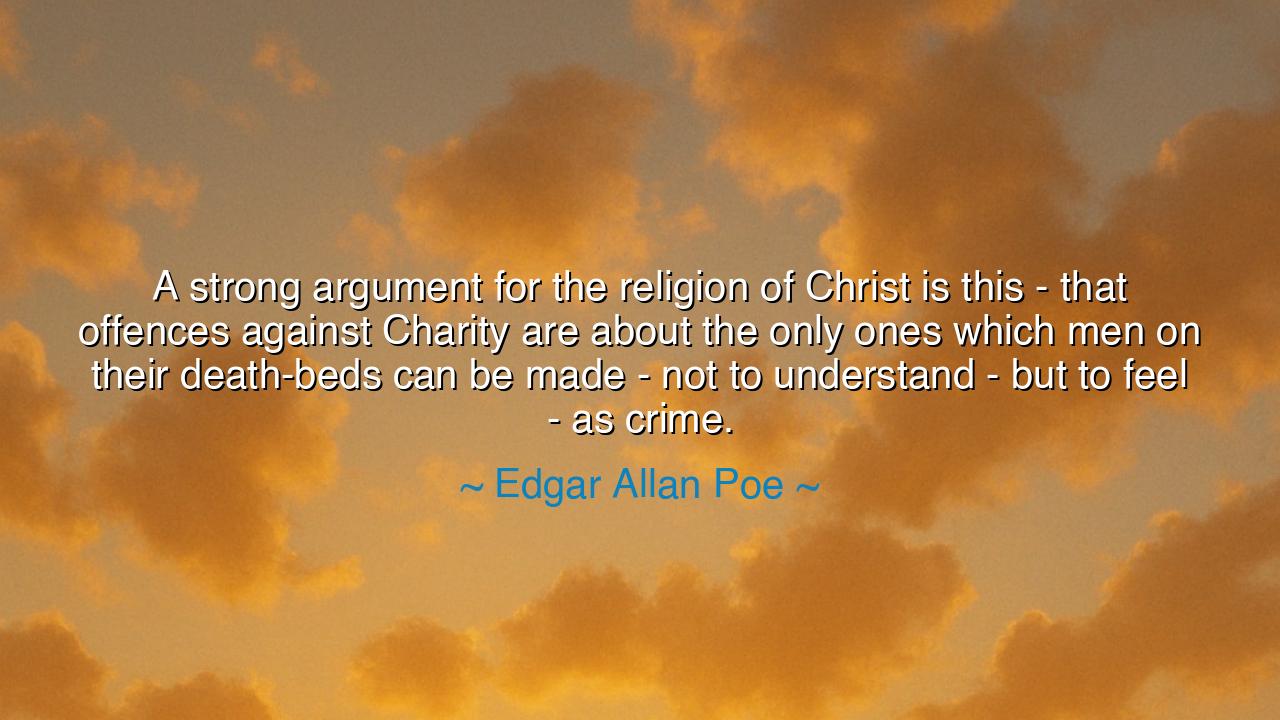
A strong argument for the religion of Christ is this - that
A strong argument for the religion of Christ is this - that offences against Charity are about the only ones which men on their death-beds can be made - not to understand - but to feel - as crime.






In the quiet melancholy of his genius, Edgar Allan Poe once wrote: “A strong argument for the religion of Christ is this — that offences against Charity are about the only ones which men on their death-beds can be made — not to understand — but to feel — as crime.” These words, solemn and profound, strike at the deepest chords of conscience. In them, Poe unveils a truth that transcends doctrine and reaches into the marrow of the human soul: that at the end of life, when illusions fall away and pride is silenced, it is not our failures of intellect, nor our lapses of ambition, that torment us — but our failures of love.
The origin of this reflection lies not merely in Poe’s poetic mind, but in the long and tragic observation of human frailty. Though remembered for his tales of darkness and despair, Poe was also a moral philosopher, haunted by the contradictions of the human heart. He saw that reason, with all its brilliance, could justify cruelty and ambition — but that the religion of Christ, centered upon Charity, struck deeper than reason. It spoke not only to the mind, but to the soul’s final reckoning. “Offences against Charity” — that is, acts of coldness, of selfishness, of withheld compassion — are those sins that cannot be washed away by clever argument or intellectual pride. They cling to the heart until it breaks.
What Poe means, then, is that at the threshold of death, when the veil between worlds grows thin, the soul suddenly feels what it once ignored. The man who spent his years chasing wealth or power, who trampled others for gain, who refused mercy when it was in his power to give — such a one may not fear punishment, but he will feel guilt. Not the guilt taught by dogma, but the living fire of remorse that awakens when all masks are stripped away. In that moment, as the body weakens and the spirit prepares to depart, the only true crime one can feel is the crime against love — the failure to be kind, to forgive, to care.
History offers countless mirrors to this truth. Recall Ebenezer Scrooge, the miserly creation of Dickens — a figure not unlike Poe’s own moral archetypes. Though fictional, Scrooge’s transformation is real to every soul that has glimpsed its own hardness. He was a man who lived by calculation, whose heart was encased in logic and self-interest. Yet when shown the measure of his life — not by punishment, but by compassion — he broke. What saved him was not fear, but Charity, the rediscovery of love as the only law worth obeying. And so, too, Poe teaches that the greatest argument for Christ’s way is not theology or miracles, but this simple human truth: love is the only thing that redeems.
In Christianity, the virtue of Charity — or agape, divine love — is the heartbeat of all virtue. Christ’s commandment was not complex: “Love one another as I have loved you.” And it is this law, Poe suggests, that time and mortality reveal as eternal. The proud man, the skeptic, the sinner — all, in the end, are confronted with the same realization: that every act of cruelty leaves a shadow upon the soul, while every act of kindness endures as light. Thus, Poe, though no preacher, gives testimony to what every dying man discovers — that life’s true measure is not in achievement or intellect, but in Charity given and received.
But how subtle is this offence! For cruelty often hides beneath indifference, and selfishness cloaks itself in reason. The greatest failures of love are not always acts of hatred, but moments of apathy — the word left unsaid, the hand withheld, the forgiveness delayed. It is these small betrayals that return to us at the end, not as accusations from others, but as sorrows within our own hearts. In the silence before death, the soul sees clearly — and what it sees most painfully is where it withheld love.
So, my children, let this teaching be engraved upon your hearts: do not wait for the death-bed to awaken compassion. Live now as though the final hour were near. Give freely. Forgive swiftly. Speak kindly. Let no day pass without an act of Charity, for in each act, you align yourself with the eternal spirit that Poe recognized in the religion of Christ — the spirit of love that heals and redeems. The cleverness of the mind fades; the strength of the body decays; but love, once given, never dies.
And thus, the wisdom of Edgar Allan Poe, the poet of shadows, becomes a beacon of light: that the truest religion is not found in creed, but in Charity — that when all else falls away, the only sin that still pierces the soul is the failure to love. Live, then, with tenderness and courage, for only through love does the soul find peace — both in this life and beyond.






AAdministratorAdministrator
Welcome, honored guests. Please leave a comment, we will respond soon